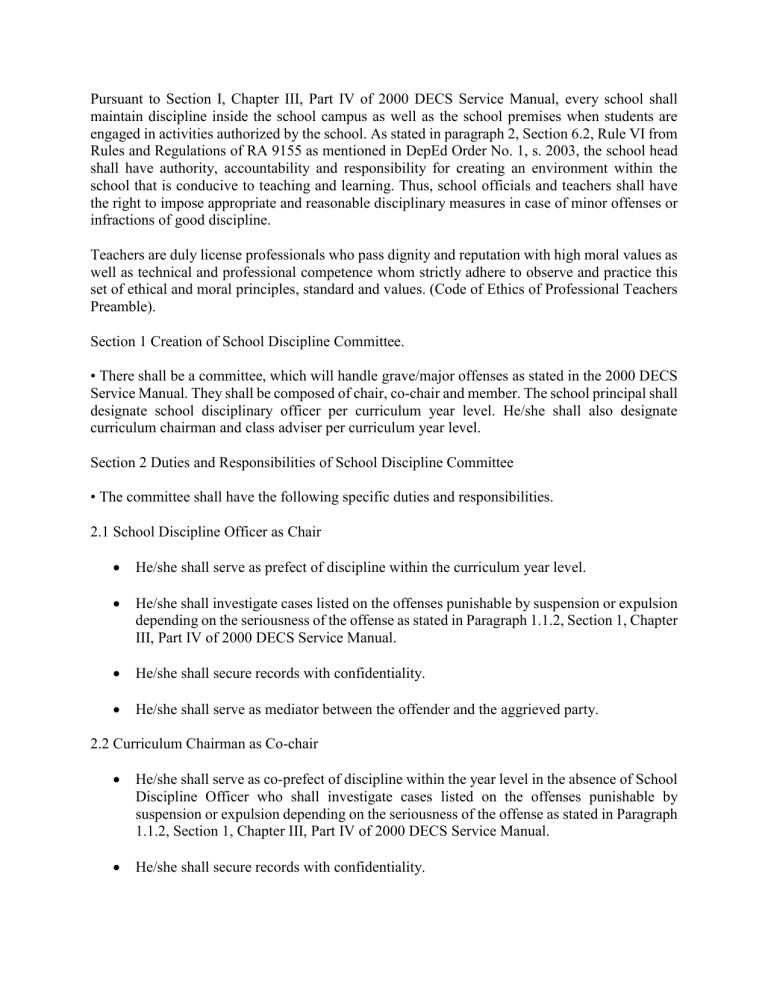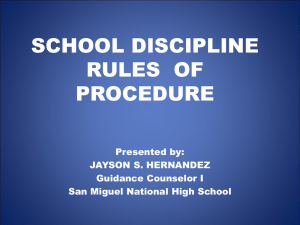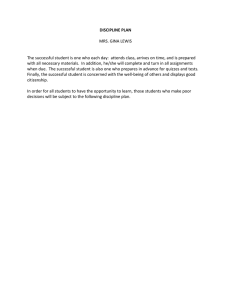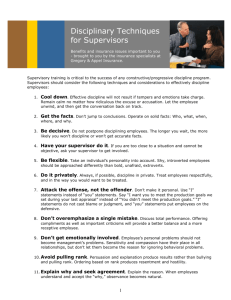
Pursuant to Section I, Chapter III, Part IV of 2000 DECS Service Manual, every school shall maintain discipline inside the school campus as well as the school premises when students are engaged in activities authorized by the school. As stated in paragraph 2, Section 6.2, Rule VI from Rules and Regulations of RA 9155 as mentioned in DepEd Order No. 1, s. 2003, the school head shall have authority, accountability and responsibility for creating an environment within the school that is conducive to teaching and learning. Thus, school officials and teachers shall have the right to impose appropriate and reasonable disciplinary measures in case of minor offenses or infractions of good discipline. Teachers are duly license professionals who pass dignity and reputation with high moral values as well as technical and professional competence whom strictly adhere to observe and practice this set of ethical and moral principles, standard and values. (Code of Ethics of Professional Teachers Preamble). Section 1 Creation of School Discipline Committee. • There shall be a committee, which will handle grave/major offenses as stated in the 2000 DECS Service Manual. They shall be composed of chair, co-chair and member. The school principal shall designate school disciplinary officer per curriculum year level. He/she shall also designate curriculum chairman and class adviser per curriculum year level. Section 2 Duties and Responsibilities of School Discipline Committee • The committee shall have the following specific duties and responsibilities. 2.1 School Discipline Officer as Chair He/she shall serve as prefect of discipline within the curriculum year level. He/she shall investigate cases listed on the offenses punishable by suspension or expulsion depending on the seriousness of the offense as stated in Paragraph 1.1.2, Section 1, Chapter III, Part IV of 2000 DECS Service Manual. He/she shall secure records with confidentiality. He/she shall serve as mediator between the offender and the aggrieved party. 2.2 Curriculum Chairman as Co-chair He/she shall serve as co-prefect of discipline within the year level in the absence of School Discipline Officer who shall investigate cases listed on the offenses punishable by suspension or expulsion depending on the seriousness of the offense as stated in Paragraph 1.1.2, Section 1, Chapter III, Part IV of 2000 DECS Service Manual. He/she shall secure records with confidentiality. He/she shall serve as mediator between the offender and the aggrieved party. 2.3 Class Adviser as Member a) He/she shall serve as liaison between the school and the parents or guardians. b) He/she shall write letters (See Appendix A) to call the attention of parents or guardians to invite for a conference. c) Prepare the anecdotal report (See Appendix F) and safeguard confidentiality. Section 3 Referral. All cases beyond the control and expertise of School Discipline Committee shall be referred to the following offices and furnish copy of referral form (See Appendix C) attached with anecdotal report (See Appendix F) and other supporting documents for more extensive supervision and control. 3.1 Office of the Principal The case needs administrative action. The case needs for referral to other government agency and private institutions. 3.2 Office of Guidance and Counseling The client manifests deviant and maladjustment behaviors. The client violates the school rules and regulations in spite of signing the behavior contract (See Appendix D). The client needs to seek professional help. Section 4 Jurisprudence. All minor offenses or infractions of good discipline shall be handled first by class advisers. However, if the case is a grave offense, the class adviser is expected to refer the case to the School Discipline Committee. They shall call the attention of parents or guardians for a short conference (See Appendix A) and prepare the anecdotal report (See Appendix F). When the parties involved are between and/or among different year levels, the jurisdiction of school discipline officer shall be based on the year level of the primary offender. The School Grievances and Complaints Committee (SGCC) shall handle all sensitive cases and when the parties involved are between or among students and teaching and/or non-teaching staff. Section 5 Guidelines in Attendance and Punctuality The following guidelines in attendance and punctuality as stated in the Paragraph 1.2, Section 1, Chapter III, Part IV of 2000 DECS Service Manual shall be observed. Regularity of attendance and punctuality are required in all classes. A student who has been absent or has cut classes is required to present a letter of explanation from his/her parents or guardians or to bring them to school for a short conference with the section adviser or guidance counselor as the case may be. Attendance of students in special holidays, activities relative to their religions shall be allowed provided permission of the school head is sought. – A student who incurs absences of more than twenty percent (20%) of the prescribed number of class or laboratory periods during the school year or term should be given a failing grade and given no credits for the course or subject. Furthermore, the school head may at his/her discretion and in the individual case exempt, a student who exceeds the twenty percent limit for reasons considered valid and acceptable to the school. Such discretion shall not excuse the student concerned from responsibility in keeping up with lesson assignments and taking examinations where indicated. The discretionary authority is vested in the school head, and may not be availed of by a student nor granted by a faculty member without the consent of the school head. Habitual tardiness especially during the first period in the morning and in the afternoon shall not be allowed. Teachers concerned shall call for the parents of the student concerned (See Appendix A) or visit him/her at home (See Appendix B). Section 7 Categories of Offenses to the School Rules and Regulations. The following offenses shall be categorized as: 7.1 Grave Offense. The offenses punishable by suspension or expulsion depending on the seriousness of the offense stated in Paragraph 1.1.2, Section 1, Chapter III, Part IV of 2000 DECS Service Manual are considered grave offenses. Gross misconduct Cheating and stealing Assaulting a teacher or any other school authority or his agents or students Smoking inside the school premises Vandalism, writing on or destroying school property like chairs, tables, windows, books, laboratory equipment and others Gambling of any sort Drinking intoxicants and liquor Carrying and concealing deadly weapons Extortion or asking money from others Fighting causing injury to others Using, possessing, and selling of prohibited drugs Hazing in any form or manner whether inside or outside the school premises Immorality or sexual harassment Instigating, leading or participating in concerned activities leading to stoppage of classes Preventing, threatening students or faculty members or school authorities from discharging their duties or from attending classes or entering school premises Forging or tampering with school records or transfer forms 7.2 Minor Offense. The minor offenses or infractions of good discipline to school rules and regulations are the following: Absenteeism, cutting of classes and tardiness Failure to wear prescribed uniform Wearing of cap and the like inside the school building specially inside the classroom Wearing of earrings for the boys and more than a pair of earrings for the girls, outlandish hairstyles, painting of tattoo, over accessories and body piercing Patronizing suspected prostitution den, gambling and pornographic places Using profane language to insult another Littering (plastic cups, bottles, candy wrappers or any waste) inside the school campus specially inside the classroom and corridors Loitering and staying inside or outside the school during class hour Bringing, using and selling of pornographic materials Using different gadgets like cellular phones , ipad, psp, etc. during class hour Public display of affection (PDA) like holding hands, hugging, kissing, necking, petting and fondling Unruly behavior during assemblies, religious services, etc. Going to restricted places Selling stolen goods in school Refusal to display school ID prominently and placing stickers and other objects on school ID Sitting on tables, standing on benches as sitting with feet up and legs wide apart Writing or drawing on a fellow student’s books and notebooks. Borrowing without returning Spending for personal use of funds entrusted to him/her Refusing to obey a student leader when the latter is discharging his/her duty or representing an authority Irresponsibly playful like pulling chair away when one is about to sit; hiding another’s property; blocking another’s path, etc Jumping over the fence Disrespectful to the national flag and singing of national anthem Spitting elsewhere Chewing of bubble gum inside the school during class hour and placing of bubble gum on chairs, walls, etc. Putting make-up and face powder during class hour Urinating elsewhere or in inappropriate places Voyeurism Not giving letter to parents Bullying including physical, emotional, mental and cyber-bullying Section 8 Penal Provisions. The school head have mandated of authority, accountability and responsibility for creating an environment conducive to teaching and learning within the school that is he/she be the only deemed person in authority. The principal as the school head is therefore in power to determine and execute the necessary sanction mandated by the school rules and regulations. In the exercise of discretion given to the principal, all submitted reports and recommendations by the various levels of officers (guidance counselor, school discipline officer, curriculum chairman and class advisers) shall be considered supportive and guidelines for proper basis of judgment, fair and just decision. In case of irresponsible and undesirable behavior, the following sanctions may be imposed: Oral warning and written reprimand. The violator shall be reminded on his/her misbehavior and shall sign on the behavior contract (See Appendix D) together with his/her parent/guardian. The case should be recorded in the confidential log book. Probationary. The violator shall be required to undergo therapy. There are two types of therapy: the school therapy and home therapy. In school therapy, the student shall be given school tasks that aim to develop his/her sense of responsibility, moral character and personal discipline under the supervision of guidance counselor, school discipline officer and class adviser. On the other hand, home therapy shall be given to student who needs parental guidance. He/she shall be given tasks that aim to develop his/her intra personal skills under the supervision of guidance counselor, school discipline officer, class adviser and parents/guardians. Suspension. The violator may be suspended for a fixed period. It will be recorded in the student’s anecdotal record (See Appendix G). Expulsion. The violator shall be banned on enrolment. His/her right to avail free public education shall be terminated. Category First Offense Second Offense Refer to the Refer to the Class Adviser School Discipline Officer Refer to the Minor Principal Offense/Sanction Oral Reprimand Oral and Written Reprimand Third Offense Refer to the Guidance Counselor Fourth Offense Probationary Suspension Refer to the Principal Grave Offense/ Sanction Refer to School Discipline Officer the Refer to the Guidance Counselor Oral and written Probationary reprimand. Refer to the Principal Suspension Refer to the School Grievances and Complaints Committee. Expulsion NOTE: For first and other offenses, which are not very serious in nature, a suspension from school not to exceed three (3) days may be authorized by the principal without the approval of the Division Superintendent. However, parents must be informed by the teacher or the school principal of any misconduct on the part of their children for which disciplinary action is necessary (Paragraph 1.1.2, Section 1, Chapter III, Part IV of 2000 DECS Service Manual). Section 9 Miscellaneous Provisions. The use of corporal punishment by teachers (slapping,jerking or pushing student about) imposing manual work or degrading task as penalty; meting out cruel and unusual punishment of any nature; holding up a student to unnecessary ridicule; the use of epithets and expressions tending to destroy the student self respect and the permanent confiscation of the personal property of students are forbidden. (Paragraph 1.1.2, Section 1, Chapter III, Part IV of 2000 DECS Service Manual) Under Section 10, RA 9211 known as “The Tobacco Regulation Act of 2003,” the sale or distribution of tobacco products is prohibited within one hundred (100) meters from the point of the perimeter of a school, public playground or any other facility frequented particularly by minors. – The organization of fraternities and sororities is strictly prohibited. Penalty for non-compliance is expulsion of student. (Paragraph 4.3.3, Section 4, Part III of 2000 DECS Service Manual; DECS Order No. 20, s. 1991; DepEd Order No. 7, s. 2006). – The following policies regarding the prohibition on the use of cell phones as stated in DepEd Order No. 83, s. 2003 shall be implemented. Ban on the use of cell phones by the students during class hour. Educate students on the responsible use of cellphones to prevent them from engaging in misguided and immoral activities. – Article IV Section 44 of RA 9165 otherwise known as “The Comprehensive Dangerous Drugs Act of 2002” provides for the purpose of enforcing the provisions of Article II of this Act, all school heads, supervisors and teachers shall be deemed persons in authority and as such are hereby vested with the power to apprehend, arrest or cause the apprehension or arrest of any person who shall violate any of the said provisions. – The School Security shall be in-charged for the monitoring of violators to school rules and regulations. They shall advise to report any untoward incidence and irregularities to the proper authority. Protocol should be observed. – Section 6, RA 6655, known as "Free Public Secondary Education Act of 1988." provides that “The right of any student to avail of free public high school shall terminate if he fails for two (2) consecutive school years in the majority of the academic subjects in which he/she is enrolled during the course of the study unless such failure is due to some valid cause.” (Paragraph 1.1.2, Section 1, Chapter I, Part IV of 2000 DECS Service Manual). Due to some valid cause means that the circumstances for such failures may be attributed to reasons beyond the students’ control such as illness, family instability or environmental disturbances (DECS Order No. 44, s. 1988). – Under Paragraph b, Section 3 of RA 7877, known as “The Anti-Sexual Harassment Act of 1995” declared that any person who directs or induces another to commit any act of sexual harassment or who cooperates in the commission thereof by another without which it would not have been committed, shall also be held liable. – Enrollees are advised to attend orientation and shall besigned to an agreement during enrolment (See Appendix E) Section 10 Separability Clause. The School Discipline Rules of Procedure shall be subjected for revisions depending on the need arise. Future amendments shall be circularized to all concerned. Any previous rules and regulations in conflict with this School Discipline Rules of Procedure are hereby rescinded. It shall take effect starting year 2009-2010 and years thereafter


